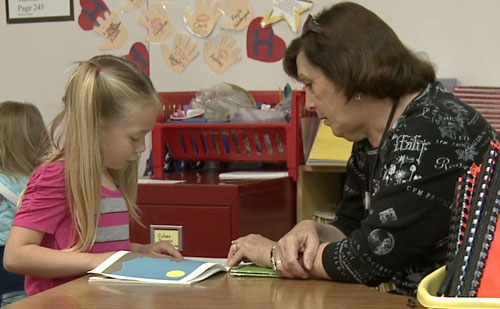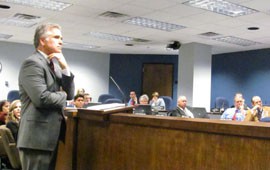Cronkite News has moved to a new home at cronkitenews.azpbs.org. Use this site to search archives from 2011 to May 2015. You can search the new site for current stories.
Huppenthal: Poor information technology hurting Arizona schools
PHOENIX – An outdated and inefficient information technology system through which schools provide data to the state wastes staff time and creates roadblocks for those seeking to use the information, Superintendent of Public Instruction John Huppenthal said Monday.
“Our IT system is still in intensive care,” Huppenthal told lawmakers in his State of Education address. “Without continued, focused care, our IT system will continue to linger on life support, and it is our teachers, administrators and students who will suffer.”
Huppenthal also used the address to a joint session of the House and Senate education committees to say he plans to pursue a waiver from No Child Left Behind, the federal education accountability law.
A former state representative and senator elected to the state’s top education job in 2010, Huppenthal said the more than 150 data systems used by the Arizona Department of Education impose “extraordinary” administrative costs because schools have to enter the same information multiple times.
The systems also aren’t user friendly, he said, making it difficult for teachers and principals to get information they need to lead classrooms and schools and for parents to make informed choices about which schools are best for their children.
“It is a mark of shame for me that I was chairman of Education and on the Appropriations committees for so many years and this situation was allowed to deteriorate to this extent,” Huppenthal told the lawmakers. “It will be a mark of shame on you if we are still in this same situation eight years from now.”
He said he supports SB 1455, authored by Sen. Rich Crandall, R-Mesa, the Senate Education Committee chairman, which would allow a credit on insurance premium taxes and corporate taxes to help fund public schools and improve the statewide data system. The bill was awaiting action by the Senate Education Committee.
In attempting to fix the problem, the Department of Education has replaced hardware and its operating system and reprogrammed hundreds of sections of code in the last year, Huppenthal said, but problems remain.
“We appreciate the hard work of Huppenthal and his staff toward improving efficiency in the data system,” said Chuck Essigs, director of governmental relations for the Arizona Association of School Business Officials. “There have been improvements in timeliness and accuracy, but … there is still room for further improvement.”
Meanwhile, Huppenthal said receiving a waiver from No Child Left Behind would allow Arizona schools to focus entirely on the state’s new A-F school accountability letter grade system. The Obama administration approved such waivers for 10 states last week. The superintendent said state officials would make their request later this month, though it wasn’t clear how long a decision would take.
“This waiver will allow us to free ourselves from burdensome regulations, streamline duplicate processes and enable Arizona to use the very best science to drive education policy,” Huppenthal said.









